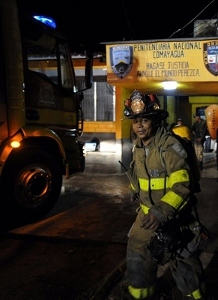Archive for February 15th, 2012

One child in four too malnourished to grow properly
 (The Independent): A quarter of young children around the world are not getting enough nutrients to grow properly, and 300 die of malnutrition every hour, according to a new report that lays bare the effects of the global food crisis. There are 170 million children aged under five whose development has been stunted by malnutrition because of lack of food for them and their breastfeeding mothers, and the situation is getting significantly worse, according to research by the charity Save the Children. In Pakistan, Bangladesh, India, Peru and Nigeria recent rises in global food prices are forcing the parents of malnourished children to cut back on food and pull children out of school to work.
(The Independent): A quarter of young children around the world are not getting enough nutrients to grow properly, and 300 die of malnutrition every hour, according to a new report that lays bare the effects of the global food crisis. There are 170 million children aged under five whose development has been stunted by malnutrition because of lack of food for them and their breastfeeding mothers, and the situation is getting significantly worse, according to research by the charity Save the Children. In Pakistan, Bangladesh, India, Peru and Nigeria recent rises in global food prices are forcing the parents of malnourished children to cut back on food and pull children out of school to work.
According to the report, A Life Free from Hunger: Tackling Child Malnutrition, a third of parents surveyed said their children routinely complain they do not have enough to eat. One in six parents can never afford to buy meat, milk or vegetables. It suggests that six out of 10 children in Afghanistan are not getting enough nutrients to avoid stunted growth.
"If no concerted action is taken," warns Justin Forsyth, the charity's chief executive, "half a billion children will be physically and mentally stunted over the next 15 years".
Robbery pepper spray came from cop’s home
(CNS): The two teenagers convicted last year of the robbery at the Blackbeard’s store in Grand Harbour were found to have handcuffs and pepper spray in their possession that had been stolen from a police officer’s home in an earlier burglary. Jonathan Welcome (18) and Jordon Powell (19) were sentenced to 6 years for a foiled daylight hold-up at a liquor store after they were apprehended by civilians at the scene. The teenagers were carrying a load shotgun, which failed to fire, as well as pepper spray which they used during the struggle with the civilians who prevented their escape. The court heard Friday that the pepper spray belonged to a serving police officer.
The teens are now facing burglary and handling stolen goods charges and although the two are denying being responsible for the burglary at the police officers house, their defence attorney told the court that the two young men were willing to plead guilty to handling stolen goods.
Welcome and Powell pleaded guilty to attempted robbery, possession of an unlicensed firearm and other related offences in connection with their bungled heist at Blackbeard’s and their attempts to rob a member of the public.
The loaded firearm was later discovered to be faulty and not capable of firing but the court heard during the sentencing hearing that one of the young men had his finger on the trigger and had attempted to fire the weapon during the struggle that ensued with the witnesses to the attempted robbery. Charles Ebanks who grabbed the barrel of the gun and struggled with the teen offender did not know at the time that the firearm was faulty. He along with Edward Azan and Ray MacGuire had gone on to chase the would-be robbers, as well as disarmed and restrained them until the police arrived.
‘Bermuda Cliff Jumping’ goes viral on YouTube
(CNS): A teenager's video of his Bermuda vacation, which includes many shots of a group of friends jumping into the ocean at Abbott’s Cliff, has been viewed on YouTube so far over 150,000 times, and now that it has been featured by the Huffington Post website it will no doubt become even more popular. 15-year-old Giles Lorimer Turner, who made the video last August with his 16-year-old brother James using a waterproof, shockproof, near-indestructible GoPro camera, told the Royal Gazzette that by October the video was getting 30 or 40 views a day. “I remember telling one of my friends we were ecstatic just to get 700 views. I don’t know how, but it went viral," he said.
Giles, a student at the UK's Rugby School, said, “We were at Admiralty House park and did a lot of cliff jumping there. Those jumps were planned very carefully. We made sure it was deep water at high tide. It’s exhilarating up there you get up top and you know it’s deep water and high tide. I don’t want to say it’s group pressure, but you have to overcome some fear. We just want to have a good time, but you don’t want to do stunts and risk it.
“The cliff jumping video was shot all in the same day. We went that afternoon to Abbott’s Cliff. You get a really nice panoramic view there. We shot that around August 20, and I think we put it up around August 24.”

Judge warns defendant over witness harassment
(CNS): A grand court judge warned an accused man Friday that having friends and family call a witness won’t help his situation and is likely to ensure he would remain in custody until his trial. Jonathan Mellard has been charged with wounding and was hoping that the charges against him would be dropped as a result of the main witness withdrawing his complaint. However, the crown revealed that the witness still intended to testify against the accused man despite phone calls made to him to persuade him otherwise. The defendant’s attorney told the court of his intention to apply for bail if the trial was to go ahead but the judge said the calls would not help the defendant’s case.
Prosecuting counsel Marilyn Brandt told Justice Seymour Panton that the complainant was going ahead despite claims by the defence that he was not willing to testify. She told the court the witness had made no indication that he wanted to withdraw the charges but he did state that he had received calls from people who wanted him to stop the legal proceedings.
The judge said the people involved were “playing a dangerous game” in their efforts to stop the case and such reports would need to be given serious consideration by whichever judge heard the bail application. Aside from warning the callers about the damage they were doing to the defendant’s chances of getting bail he pointed out that it is not up to the witness to decide if the case goes ahead. “It is not his prerogative to say if the case proceeds,” the judge said adding that if a wounding has happened then it should be prosecuted by the crown.
The defence attorney asked for the case to be adjourned for two weeks so that he could proceed with the bail application.

High school opening delayed
 (CNS): The opening of Clifton Hunter high school, which was on schedule for Easter, has been postponed again. The education minister told CNS last week that he believed the plan for the students to begin moving in after the Easter holiday could be disrupted as a result of what he described as “shoddy work” at the site that had to be addressed. Rolston Anglin has not yet confirmed the details of what he called an “unexpected delay” but it is understood that the school will now not open until September and the start of the 2012-13 academic year. He denied that the move was political and he stated that the current administration was committed to opening the first of the two high school projects as soon as possible.
(CNS): The opening of Clifton Hunter high school, which was on schedule for Easter, has been postponed again. The education minister told CNS last week that he believed the plan for the students to begin moving in after the Easter holiday could be disrupted as a result of what he described as “shoddy work” at the site that had to be addressed. Rolston Anglin has not yet confirmed the details of what he called an “unexpected delay” but it is understood that the school will now not open until September and the start of the 2012-13 academic year. He denied that the move was political and he stated that the current administration was committed to opening the first of the two high school projects as soon as possible.
The two high school projects have become the biggest, and it appears from the current government’s claims the most expensive, political footballs that Cayman has ever seen and became a point of enormous contention during the 2009 election campaign.
Alden McLaughlin, the opposition leader and former education minister, commissioned the projects as a result of what he had described as a pressing need to address the overcrowding and sub-standard conditions in which the country’s students were being educated. He told CNS that he had been very disappointed to hear recently that the opening of the school would be delayed yet again but not surprised.
McLaughlin said he understood the delay was down to cash. Government now has five school projects on the go and he claimed it was facing serious financial problems in its efforts to complete any of them.
“Government is scrambling to find money to complete the primary school additions, they have abandoned the John Gray project and they don’t have the money to finish Clifton Hunter and have pushed back the opening date to September and even that date is opening to question because of funding issues.”
He acknowledged that the country needed to work on the primary schools but he said it was a question of priorities as the government now was struggling to find the money to complete anything at all.
McLaughlin also questioned the increased figures that government continues to throw out about each of the schools costing $100million.
“The big question is how we got to a $100 million, because the majority of the expenditure has been incurred under this administration and there has been no public accounting of how we got to this figure,” he stated.
The original contract to build the schools was around $110milllion for both buildings $51 million for Clifton Hunter and $59 million for John Gray. After the project started, however, the contractors, Tom Jones International claimed some $17 milllion in overruns before getting into a dispute with government and walking off the job site in November 2009. They later filed suit against the Cayman Islands Government, a case which is continuing through the courts.
McLaughlin, who has faced persistent criticism over the high school projects, stated that despite the financial issues he had been committed to the two high schoolsas a question of equality. The current minister, he said, was now facing the potentially serious and unfair problem of inequality in education.
If and when Clifton Hunter opens, the students from one geographical area of Grand Cayman will have access to a state-of-the-art school, while the other students from George Town and West Bay will be left in the ever deteriorating unacceptable conditions of John Gray.
“A lot of people still beat up on me,” he said about his continuation with the two projects in the face off government’s deteriorating financial fortunes, “but it was about my commitment to equity in education because it is just wrong in principle to have the kids from one area having access to all of these facilities, amenities and opportunities while other kids, just because of where they are from, do not have access. My policy was when we do the high schools they had to be done all at once so all kids had the same opportunities. That is not what is going to happen now.”
Anglin told CNS that he was well aware of the inequity that would arise once Clifton Hunter opened while the John Gray projected remained stalled, but he said that was the way it had to be as the UK would simply not allow government to borrow the money needed to carry-on with both schools. He acknowledged that the students affected would also be those from his constituency and that if it affected his election chances then so be it. The minister said he was not doing his job to win the election but was doing what was right for the country.
The current education minister also denied that his attention on the redevelopment of the primary schools had anything to do with him seeking his own legacy as education minister or that he should have prioritised the secondary school projects over the new primary school sites. Anglin said that the overcrowding and problems in the primary school were a priority and needed to be addressed.
McLaughlin said he appreciated that there were huge demands on the limited amount of money that government had to spend on education but it was a question of priorities. He said he feared that the constant delays at Clifton Hunter were because once people’s children start going to that school a lot of the negativity that he said had attended him would stop as people recognised what he had been trying to achieve.

Cash on offer for ‘good governance’ projects
 (CNS): The governor’s office has up to $10,000 to give away to local activists, groups, individuals charities or other organisations that are planning projects which relate to good governance and transparency; respect for human rights; crime reduction and an effective criminal justice system or awareness and protection of the environment. The money comes from an annual grant from the Overseas Territories Programme Fund through the Foreign and Commonwealth Office to support what officials described as ‘worthwhile projects” in Cayman. The search is no on to find relevant projects in need of financial support for the period April 2012 – March 2013.
(CNS): The governor’s office has up to $10,000 to give away to local activists, groups, individuals charities or other organisations that are planning projects which relate to good governance and transparency; respect for human rights; crime reduction and an effective criminal justice system or awareness and protection of the environment. The money comes from an annual grant from the Overseas Territories Programme Fund through the Foreign and Commonwealth Office to support what officials described as ‘worthwhile projects” in Cayman. The search is no on to find relevant projects in need of financial support for the period April 2012 – March 2013.
The proposal should have concrete outcomes and the potential to have a lasting impact on the Cayman Islands, the office explained, with the support of a local organisation if the proposal comes from an individual and must take place within the 12 month period specified.
“This is a relatively small fund, but we have used it to good effect in the past and I am keen for this to continue,” Duncan Taylor said Tuesday.
In the past the money from the fund has been used for a diverse range of projects such as an early intervention project for at-risk children, the security scanning chair at the prison, a public information campaign for the Gender Equality Bill, a lionfish study and a survey into the role of Civic Society.
For more information, please visit the website of the Governor’s Office www.ukincayman.fco.gov.uk. To receive a project bidding form please contact Tom Hines at the Governor’s Office: Tom.Hines@fco.gov.uk, tel. 244 2434.
Minimum sentences don’t reduce crime, says report
(CNS): A report conducted by the Institute of Public Administration of Canada into the state of Cayman’s prison system said that there is no evidence minimum sentences reduce crime. Cayman has mandatory minimum sentences for various offences, including a ten year minimum for anyone convicted after trial of possession of an unlicensed firearm. The experts said that local stakeholders had expressed concerns about the impact minimum sentences had on crime prevention and rehabilitation. The report has recommended an immediate review of the current slate of offences with minimum sentences to determine if it is the most effective way to respond to offending.
“It is important that legislation … should not operate to frustrate prevention, diversion and rehabilitation strategy. An appropriate legislative structure should complement, support, and reinforce a successful prevention, diversion and rehabilitation framework,” the authors stated.
They also point out that the United States is reviewing mandatory minimum sentences and crime reduction strategies as a result of the increased costs of incarceration and lack of evidence that they reduce crime.
“What mandatory minimum sentences can do is put an offender into an environment where the offender may form relationships and learn behaviours and attitudes which would lead them into further criminal activity,” the IPAC team warns.
The assessment, which is a comprehensive review of the entire prison system, highlights a number of areas where government should review other existing legislation in order to address the problems faced by the system. Cayman has one of the highest per capita inmate populations in the world as well as very high recidivism rates and the costs of housing people behind bars is become an increasing burden on the public purse as it now accounts for more than 4% of government’s entire spending.
The report says Cayman needs to make a number of major changes that will need legislative support, from the implementation of the children’s law to provide greater protection to young offenders to a review of the Alternative Sentencing Law, the Probation of Offenders Law, the Penal Code and the Misuse of Drugs Law. It notes the need to facilitate sentences that combine custody with probation.
“Legislation must provide police with the discretion to divert youth offenders and low risk adult offenders to appropriate programs in the community,” the report recommends as a way of reducing the prison population and keeping young people out of the system.
The IPAC team said that the current limits on community service are a barrier to its successful use, which could see victims benefiting from the work of offenders. “In some jurisdictions the offender performs community service for the victim, providing immediate reparation to the victim,” the authors stated. “This approach also connects the offender with the victim providing a first-hand awareness of the consequence of the criminal behaviour, and provides visible evidence of community restoration.”
The authors said that the Prevention of Crime Group Report made a recommendation in 2010 to broaden community service for minor and first time offenders but no statutory changes have taken place.
The authors also recommended establishing a separate court for young offenders. “Scheduling youth matters at a separate time from adult matters wouldenable youth appearing in court whether in custody or not to be kept separate from adult offenders,” the authors said, adding it would enable young people to be transported separately between court and jail from adult offenders.
Among the many issues noted by the authors in the comprehensive report were concerns about a lack of transparency related to the operation of the prison. The authors said this is fuelling beliefs that mistreatment of offenders is not addressed and staff are not held accountable for inappropriate behaviour.
“A number of stakeholders provided examples of concern around excessive use of force, inappropriate use of strip searches, arbitrary decision making, administration of medicine to mentally ill inmates, and an ineffective complaint process,” the authors found.
“This is contributing to a lack of confidence in the management of the prison. Although we are not able to speak to the accuracy of the concerns, the fact that these concerns are voiced by a variety of stakeholders means that at the very least action needs to be taken to increase public confidence in the administration of the facility.”
The report reveals that the Prison Inspection Board, which is supposed to increase public confidence via its reports, is expected to provide up to two days’ notice of an inspection and members are taken around the prison by prison officers. This means the inspection is not made under normal operating conditions but how the prison wants the board to think it operates.
The IPAC team recommended removing the need for prior notice and accompanying prison officers during inspections — except on the high security block – to increase public confidence in the facility.
“A well-managed prison should have no concern over the receipt of prisoner complaints -‐they are part of the institutional setting,” the authors wrote. “There will undoubtedly be prisoner complaints that verge upon the vexatious or are devoid of substance. At the same time there will be complaints of substance that will identify prison officers and prisoners.”
The fact that prisoner complaints are required to be provided in an open fashion to officers who in turn forward the complaint to the appropriate person or body means prisoners have no faith in the integrity of the inspection process or the complaints procedure.
“Any complaint procedure must provide prisoners the comfort of knowing that the process is fair, balanced, unaffected by the prison officer‐prisoner paradigm, and will operate without fear of reprisal within the prison,” the report stated. “From what was described to us about the Complaints procedure, it fails on all counts.”
See full report by the IPAC below.

Hundreds killed in prison fire in Honduras
 (BBC): A massive fire has swept through a jail in Honduras, killing at least 272 prisoners, officials say. Many of the victims were burned or suffocated to death in their cells at the jail in Comayagua, in central Honduras.Families flocked to the site, desperate for news. Some prisoners escaped the blaze by breaking through the roof to jump from the building, they said. Officials are investigating whether an electrical fault caused the blaze. The fire broke out late on Tuesday night and took more than an hour to be brought under control. Dozens of prisoners died trapped in their cells and were burned beyond recognition.
(BBC): A massive fire has swept through a jail in Honduras, killing at least 272 prisoners, officials say. Many of the victims were burned or suffocated to death in their cells at the jail in Comayagua, in central Honduras.Families flocked to the site, desperate for news. Some prisoners escaped the blaze by breaking through the roof to jump from the building, they said. Officials are investigating whether an electrical fault caused the blaze. The fire broke out late on Tuesday night and took more than an hour to be brought under control. Dozens of prisoners died trapped in their cells and were burned beyond recognition.
Comayagua firefighters' spokesman Josue Garcia said there were "hellish" scenes at the prison and that desperate inmates had rioted in a bid to escape the flames. "We couldn't get them out because we didn't have the keys and couldn't find the guards who had them," he said.
Lucy Marder, who heads the forensic services in Comayagua, said that reports indicated at least 272 people had been killed. The prison was holding more than 800 inmates. She later said that 356 people on the prison roster were unaccounted for. "The majority could be dead, though others could have suffered burns, escaped or survived," Marder said.